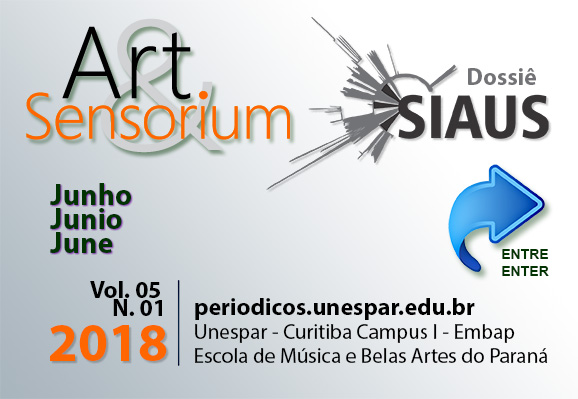Música como Leitura Sensível de Dinâmicas Urbanas: Milton Nascimento e o Desmonte da Ferrovia Bahia-Minas
DOI:
https://doi.org/10.33871/23580437.2018.5.1.15-24Keywords:
urbanização brasileira, música popular brasileira, representação social, memóriaAbstract
Este artigo investiga as potencialidades que a análise musical possui e que podem ser incorporadas em discussões sobre o urbano. Parte-se do entendimento de que a música confere leituras complementares à abordagem teórica sobre as cidades, de modo a agregar a percepção que a população tem dos processos urbanos, sintetizando um "sentimento urbano" . Aqui, utiliza-se a canção Ponta de Areia, de Milton Nascimento e Fernando Brant, para, a partir da análise da sua letra, melodia, harmonia e semiótica, discutir transformações urbanas causadas pela falência do modelo econômico das ferrovias no Brasil, e a consequente fragmentação social, cultural e histórica que se deu. A partir das ferramentas que a música possui para expressar-se, conclui-se que ela constitui um instrumento válido de discussão de temas urbanos, seja por catalisar um questionamento, seja por possibilitar a apresentação de uma perspectiva sensorial da percepção que a população tem dos fenômenos urbanos.Downloads
Download data is not yet available.
Downloads
Published
2018-06-10
Issue
Section
Dossiê: SIAUS - ESPAÇOS
License
Copyright (c) 2022 International Interdisciplinary Journal of Visual Arts - Art&Sensorium

This work is licensed under a Creative Commons Attribution 3.0 Unported License.
Authors who publish with this journal agree to the following terms:- Authors retain copyright and grant the journal right of first publication with the work simultaneously licensed under a Creative Commons Attribution License that allows others to share the work with an acknowledgement of the work's authorship and initial publication in this journal.
- Authors are able to enter into separate, additional contractual arrangements for the non-exclusive distribution of the journal's published version of the work (e.g., post it to an institutional repository or publish it in a book), with an acknowledgement of its initial publication in this journal.
- Authors are permitted and encouraged to post their work online (e.g., in institutional repositories or on their website) prior to and during the submission process, as it can lead to productive exchanges, as well as earlier and greater citation of published work (See The Effect of Open Access).


